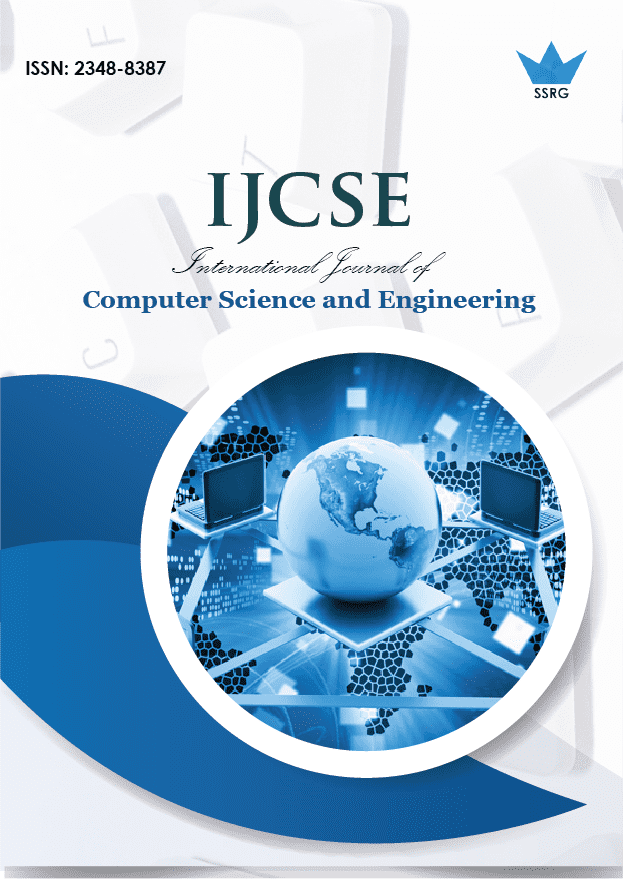Efficient Loss Recovery in Ad Hoc Networks

| International Journal of Computer Science and Engineering |
| © 2017 by SSRG - IJCSE Journal |
| Volume 4 Issue 1 |
| Year of Publication : 2017 |
| Authors : S Yasaswini, G.M.Naik, P G K Sirisha |
How to Cite?
S Yasaswini, G.M.Naik, P G K Sirisha, "Efficient Loss Recovery in Ad Hoc Networks," SSRG International Journal of Computer Science and Engineering , vol. 4, no. 1, pp. 1-7, 2017. Crossref, https://doi.org/10.14445/23488387/IJCSE-V4I1P101
Abstract:
In Ad hoc networks, providing reliable multicast service is very challenging. Providing reliable multicast service is very challenging in Ad Hoc networks. In this work, an efficient loss recovery scheme is proposed for reliable multicast. The notion of cooperative communications is applied to support local loss recovery in multicast. A receiver node experiencing a packet loss tries to recover the lost packet through progressively cooperating with neighboring nodes, upstream nodes or even source node. In order to reduce recovery latency and retransmission overhead, the proposed scheme caches not only data packets but also the path which could be used for future possible use to expedite the loss recovery process. Both analytical and simulation results reveal that proposed scheme significantly improves the reliable multicast performance in terms of delivery ratio, throughput and recovery latency compared with User Datagram Protocol (UDP) and Pragmatic General Multicast (PGM).
Keywords:
Ad hoc networks, Reliable Multicast, Cooperative Communication, Loss Recovery.
References:
[1] J. Gemmell, T. Montgomery, T. Speakman, N. Bhaskar, and J. Crowcroft, “The PGM reliable multicast protocol,” Network, IEEE, Vol. 17, No. 1, January–February, 2003.
[2] F. Xie and G. Feng, “The impact of loss recovery on congestion control for reliable multicast [J],” IEEE/ACM Transaction on Networking, Vol. 14, No. 6, pp. 1323– 1335, 2006.
[3] T. G. Mukesh, S. D. Panda, and P. Sadayappan, “A reliable multicast algorithm for mobile ad hoc networks,” Distributed Computing Systems, Proceedings of the 22nd International Conference, pp. 563–570, July 2–5, 2002.
[4] B. Ouyang, X. Y. Hong, and Y. J. Yi. “A comparison of reliable multicast protocols for mobile ad hoc networks,” SoutheastCon, Proceeding of IEEE, pp. 339–344, April 8–10, 2005.
[5] R. Chandra, V. Ramasubramanian, and K. P. Birman. “Anonymous gossip: Improving multicast reliability in mobile ad hoc networks, distributed computing systems,” In IEEE ICDCS, pp. 275–283, 2001.
[6] V. Rajendran, Y. Yi, K. Obraczka, S. J. Lee, K. Tang, and M. Gerla, “Reliable, adaptive, congestion-controlled ad hoc multicast transport protocol: Combining source-based andlocal recovery,” UCSC Technical Report, 2003.
[7] A. Fung and I. Sasase, “Hybrid local recovery scheme for reliable multicast using group-aided multicast scheme,” pp. 3478–3482, March 11–15, WCNC, 2007.
[8] Y. F. Zhu and T. Kunz, “MAODV implementation for NS- 2.26,” Systems and Computing Engineering, Carleton University, Technical Report SCE-04-01, January 2004.
[9] B. Johnson and D. A. Maltz, “Dynamic source routing in ad hoc wireless networks,” Mobile Computing, T. Imielinski and H. Korth, eds., Chapter 5, Kluwer Academic Pub-lishers, pp. 153–181, 1996.

 10.14445/23488387/IJCSE-V4I1P101
10.14445/23488387/IJCSE-V4I1P101